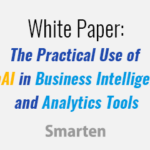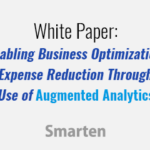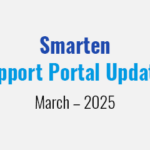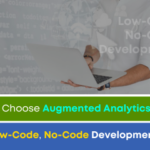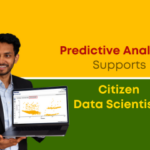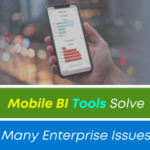
If your role in business demands that you stay abreast of changes in business analytics, you are probably familiar with the term Smart Data Discovery. You may also have read the recent Gartner report entitled, ‘Augmented Analytics Is the Future of Data and Analytics’, Published 27 July 2017, by Rita L. Sallam, Cindi Howson, and Carlie J. Idoine, highlighting the importance and benefits of augmented analytics, augmented data preparation and augmented data discovery.
For those who are managing an analytical solution implementation, or trying to select a solution for business users, it is important to understand the terms and the features and function of these solutions so that you can select the appropriate solution for your users, your data analysts and your IT team.
So, let’s dive into the definitions first!
Smart Data Discovery goes beyond data monitoring to help business users discover subtle and important factors and identify issues and patterns within the data so the organization can identify challenges and capitalize on opportunities. These tools allow business users to leverage sophisticated analytical techniques without the assistance of technical professionals or analysts. Users can perform advanced analytics in an easy-to-use, drag and drop interface without knowledge of statistical analysis or algorithms. Smart Data Discovery tools should enable gathering, preparation, integration and analysis of data and allow users to share findings and apply strategic, operational and tactical activities and will suggest relationships, identifies patterns, suggests visualization techniques and formats, highlights trends and patterns and helps to forecast and predict results for planning activities.
Augmented Data Preparation empowers business users with access to meaningful data to test theories and hypotheses without the assistance of data scientists or IT staff. It allows users access to crucial data and Information and allows them to connect to various data sources (personal, external, cloud, and IT provisioned). Users can mash-up and integrate data in a single, uniform, interactive view and leverage auto-suggested relationships, JOINs, type casts, hierarchies and clean, reduce and clarify data so that it is easier to use and interpret, using integrated statistical algorithms like binning, clustering and regression for noise reduction and identification of trends and patterns. The ideal solution should balance agility with data governance to provide data quality and clear watermarks to identify the source of data.
Augmented Analytics automates data insight by utilizing machine learning and natural language to automate data preparation and enable data sharing. This advanced use, manipulation and presentation of data simplifies data to present clear results and provides access to sophisticated tools so business users can make day-to-day decisions with confidence. Users can go beyond opinion and bias to get real insight and act on data quickly and accurately.
Why is all of this important to your organization?
Here are a few reasons you should consider advanced analytics and augmented data preparation for your enterprise:
- These solutions allow the data scientist and IT community to focus on strategic issues and special projects.
- Accessible augmented analytics creates Citizen Data Scientists and improves accountability and empowerment.
- Advances in smart data discovery and other sophisticated techniques and solutions can positively impact ROI and TCO.
- These solutions produce better decisions, more accurate business predictions and measurable analysis of product and service offerings, pricing, financials, production and other aspects of business.
- Augmented data preparation and related tools will improve user adoption, data popularity, social BI integration and data literacy.
It is not always easy to stay abreast of the terms, techniques and solutions in the analytics domain but it is well worth the effort. This market is changing rapidly with new tools and improvements introduced every year.
Whether you are an IT consultant, an in-house IT professional, a middle manager or a senior executive, it is important to monitor the progress of business analytics and the related technology. Every business needs to understand how these solutions can and will affect users, processes and workflow.
Giving your team the right tools, and a simple way to manage the overwhelming flow of data and information, is crucial to your business success and will make every team member an asset to your organization.
Original Post: What is Augmented Analytics and Why Does it Matter?



